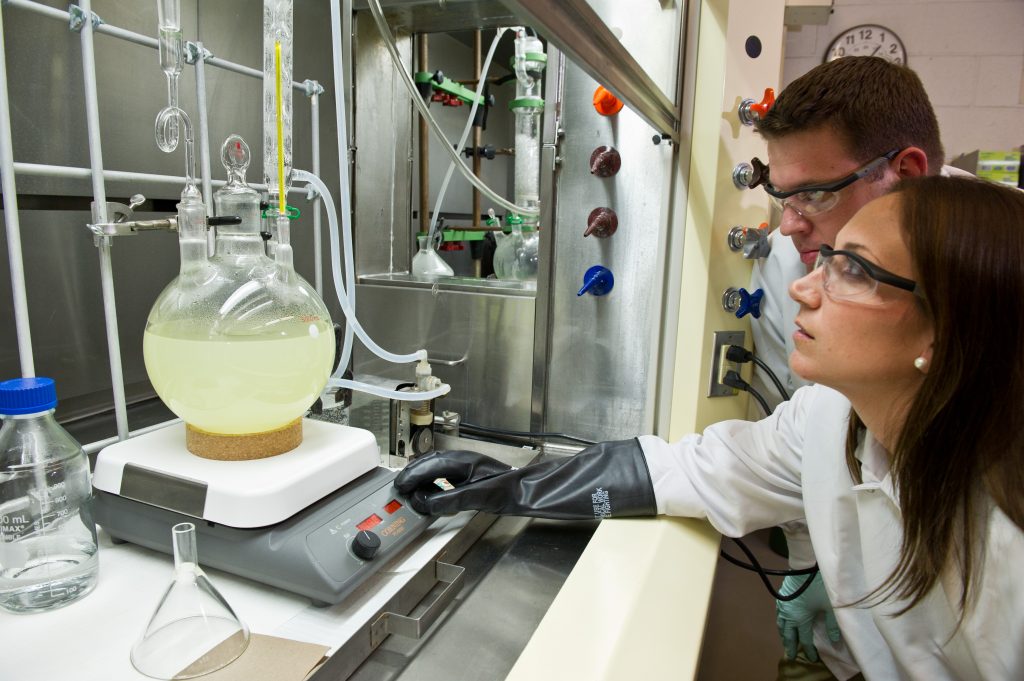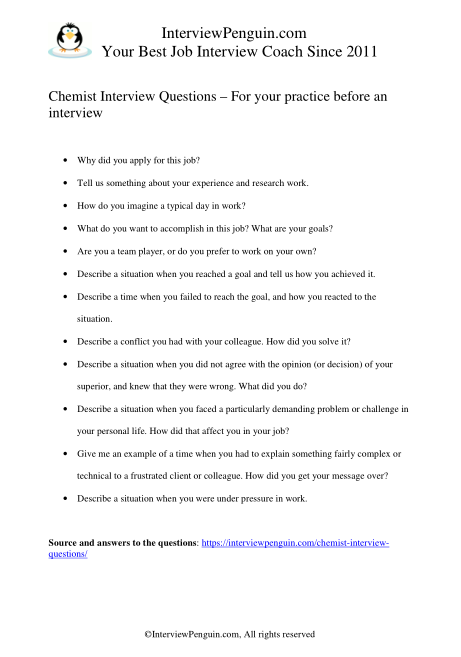Degree, experience, and the research work you have already done play a pivotal role in the hiring process. Your answers to interview questions are secondary, but bad answers can jeopardize your chances of getting the job. The good news is that you won’t compete with many people in an interview. Lab chemist, or research chemist, is not a popular job title.
On the other hand, chemists are in high demand right now, and each company will hope to have some success in their recruitment. Let’s learn how to make a good impression, and answer the questions. We can start with the questions.
Questions you will get in your chemist interview
Interview is not an exam at school. They won’t ask you any highly technical questions, you won’t have to demonstrate your proficiency in Chemistry. Your degree and diploma serve as a proof of your technical skills. If not technical questions, what questions will they ask then?
Most questions will relate to your past experience, motivation, goals, and understanding for the work you will do. They may also ask you a couple of behavioral questions, trying to understand your attitude to work, to your colleagues, and to life in general.
Why did you apply for this job?
You should not connect your job choice with the past. Saying that you apply because you graduated from Chemistry would indicate a must, not a desire.
Speak rather about the things you want to do in job, things you enjoy doing (working in the lab, researching, planning, innovating). You can also refer to the particular filed of business, and say that you always wanted to work in automotive, oil, clothing, or other industry.
A simple alternative is saying that you found the job description extremely interesting, and that’s why you applied. In such a case you should refer to one or two particular duties from the job description, or to anything else that caught your eye on it.
Tell us something about your experience and research work
Focus on the practical aspects of your research, the goals you tried to achieve, and how it helped your employer, the University, or the entire human race :). Try to avoid technical terms (I know it’s not always possible, but at least you should minimize the use), because the people leading interview with you will often not understand them.
And if you are just starting your professional career, talk about your thesis and things you’ve done at the University. In this case you can talk also about the future, and the research you want to specialize in (if any), or materials you want to work with. Needless to say, these things should correspond with the things you’d do in a new job.
How do you imagine a typical day in work?
The right answer to this questions depends on whether you’ll work in commercial or non-profit sector. Read the job description carefully, to better understand what you will do.
In any case, you should talk about your new job with enthusiasm. What is more, you should tell them that you expect to work a lot, that you like to be busy in work (and not just hang around and drink coffee). This is the attitude they seek in good job applicants.
What do you want to accomplish in this job? What are your goals?
Your goals should correspond with their goals. That means, you should talk about things you want to achieve for your employer, rather than about your personal accomplishments, such as receiving awards and professional recognition.
The good answer depends on what they do. For example, if they specialize in designing some products and your job will be to work on the materials they use in the design, you can say that you hope to help them to make their production process more effective, with the innovation and improved efficiency your research will bring to the production.
Are you a team player, or do you prefer to work on your own?
While every great result is a team effort, you may work a lot on your own as a chemist. Tell the interviewers that you enjoy being part of the team, but do not mind working on your own, especially while doing the research, or some highly technical work.
During the pandemic, you may actually work alone most of the time, or even remotely. It is important to ensure the interviewers that though you enjoy scientific discussions with clever colleagues, and their company, you do not mind working on your own when situation demands it.
Behavioral questions you may face in your chemist interview
- Describe a situation when you reached a goal and tell us how you achieved it.
- Tell us about a time when you used logic to solve a problem.
- Describe a conflict you had with your colleague. How did you solve it?
- Tell us about the biggest mistake you’ve made in your work so far.
- Describe a situation when you did not agree with the opinion (or decision) of your superior, and knew that they were wrong. What did you do?
- Tell us about a time when you showed initiative at work.
- Give me an example of a time when you had to explain something fairly complex or technical to someone who lacked technical skills. How did you get your message over?
- Describe a situation when you were under pressure in work.
- Tell me about a time you had to comply with a policy or procedure that you did not agree with.
Special Tip: I’ve seen many bright minds stutter when facing behavioral questions in the interview. If you find the question on my list difficult, and do not want to risk an embarrassing silence in your chemist interview, have a look at our Interview Success Package. Up to 10 premium answers to all difficult behavioral interview questions (+ more) will help you find the right words in every moment of the interviews, impress the hiring managers, and leave them with one option only–to give you the job…
Create a portfolio for your chemist interview
To see something is ten times better to just hear someone talking about it. Portfolio is a visualization of your best works, the results of you research, your academic achievements, and other things that matter for the employers in this sector.
Put the things together. You do not necessarily need to include originals of your diplomas and certificates–copies will do the trick. Try to use simple language in your portfolio, and avoid excessive terminology. Once you talk about your work, you should clearly explain the practical application of your research results–this matters the most for the employers…
Conclusion and next steps
Interview for a job of a chemist belongs to interviews with average difficulty. Backed with a Masters (or PhD) degree, you won’t deal with any technical questions. What is more, the competition is typically not high, and unless you remain silent when facing some tough behavioral questions, you may walk away with a new employment contract.
Get ready for the questions, and prepare a simple portfolio that demonstrates your skills, education, and results you’ve achieved with your research or work. I hope you will succeed, and wish you good luck!
Matthew
* Want to practice your interview answers later? Download a list of questions in a simple, one page long .PDF, print it, and practice anytime you want:
May also interest you:
- Work portfolio for an interview – Learn how to prepare a selection of your best works, and how to use it to show the interviewers the value you can bring to their team.
- Chemical engineer interview questions.
- Pharmacist interview questions.


